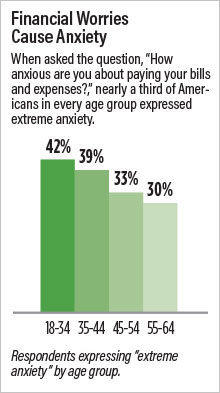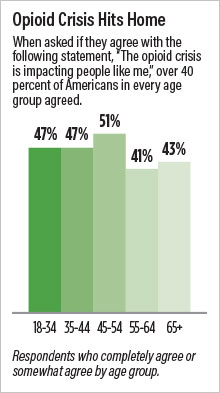APA Poll Finds Americans’ Anxiety Is Increasing, Especially About Health, Safety, and Finances
Gun violence and the opioid epidemic—both of which have afflicted communities across the country—are on the minds of Americans. And anxiety levels are up across all ages and demographic groups.
Those are some of the findings of a national survey of Americans aged 18 and older released by APA at its Annual Meeting last month. The results reflect a striking unity around the issue of gun violence—a sizeable majority, including members of both political parties, regard it as a public health hazard (see story below)—and a sadly intimate familiarity with the opioid crisis: nearly a third of people know someone addicted to opioids.
Meanwhile, the findings about rising anxiety speak to a sense of unease felt by Americans at a time when disunity and divisiveness seem to reign. Respondents were asked to rate their anxiety in five areas: health, safety, finances, relationships, and politics.
 This year’s national anxiety score—derived by mean scores on a 0-100 scale—is 51, a five-point jump since last year. Increases in scores were seen among men and women and across age groups and racial and ethnic categories. By generation, millennials continued to be more anxious than “Gen Xers” (those born after 1965) and baby boomers (those born between the end of World War II and 1964). However, the boomers’ anxiety increased the most, with a seven-point jump since last year.
This year’s national anxiety score—derived by mean scores on a 0-100 scale—is 51, a five-point jump since last year. Increases in scores were seen among men and women and across age groups and racial and ethnic categories. By generation, millennials continued to be more anxious than “Gen Xers” (those born after 1965) and baby boomers (those born between the end of World War II and 1964). However, the boomers’ anxiety increased the most, with a seven-point jump since last year.
“This poll shows U.S. adults are increasingly anxious, particularly about health, safety, and finances,” said APA President Anita Everett, M.D. “That increased stress and anxiety can significantly impact many aspects of people’s lives, including their mental health, and it can affect families. It highlights the need to reduce the effects of stress with regular exercise, relaxation, healthy eating, and time with friends and family.”
While more Americans are anxious than last year in all five areas, the greatest increase was in anxiety about paying bills. Nearly three-quarters of women, nearly three-quarters of young adults aged 18 to 24, and nearly four-fifths of Hispanic adults are somewhat or extremely anxious about paying their bills.
Regarding the opioid epidemic, the poll results indicate it has touched many households in every region of the country and across demographic categories. More Americans said they know someone who is or has been addicted to opioids or prescription pain killers compared with this time last year (31 percent this year versus 27 percent in 2017). Nearly half (46 percent) said the opioid crisis is impacting people like them, up from 37 percent in 2017.
Just under 10 percent of respondents said they have taken an opioid or prescription pain killer without a prescription. Five percent said they have abused or been addicted to opioids or prescription painkillers, up from 1 percent in 2017.
Opioid Crisis Hits Home
 People who misuse opioids often get them from a family member or friend who had gotten them by prescription. So it is not surprising that the poll found a growing percentage of Americans who said it would be easy for someone to access opioids for illicit purposes (46 percent in 2018 versus 39 percent in 2017).
People who misuse opioids often get them from a family member or friend who had gotten them by prescription. So it is not surprising that the poll found a growing percentage of Americans who said it would be easy for someone to access opioids for illicit purposes (46 percent in 2018 versus 39 percent in 2017).
Nonetheless, the survey did yield some encouraging news: more Americans believe people can recover from an opioid addiction. Eighty-two percent of respondents said they believe people can recover, up from 73 percent last year. Seventy-four percent said that they “understand how someone accidentally gets addicted to opioids,” up from 69 percent last year.
Importantly, Americans strongly favor improving access to treatment (62 percent) over imposing stricter punishments and enforcement (26 percent). “Our poll findings show that Americans are increasingly aware of the problem of opioid addiction and increasingly believe people can recover,” said APA CEO and Medical Director Saul Levin, M.D., M.P.A. “The crisis has become personal to many, and they want to see treatment available for those affected. APA is ready to work with the administration and Congress to curb this national epidemic.”
The findings are from an APA-sponsored poll conducted online using ORC International’s CARAVAN Omnibus Survey. A nationally representative sample of 1,004 adults aged 18 and over (503 men and 501 women) responded to the survey from March 22 to 25. Completed interviews are weighted by five variables: age, sex, geographic region, race, and education to ensure reliable and accurate representation of the total U.S. population aged 18 and older. The margin of error is +/- 3.1 percentage points.
|
|
|
|
|

